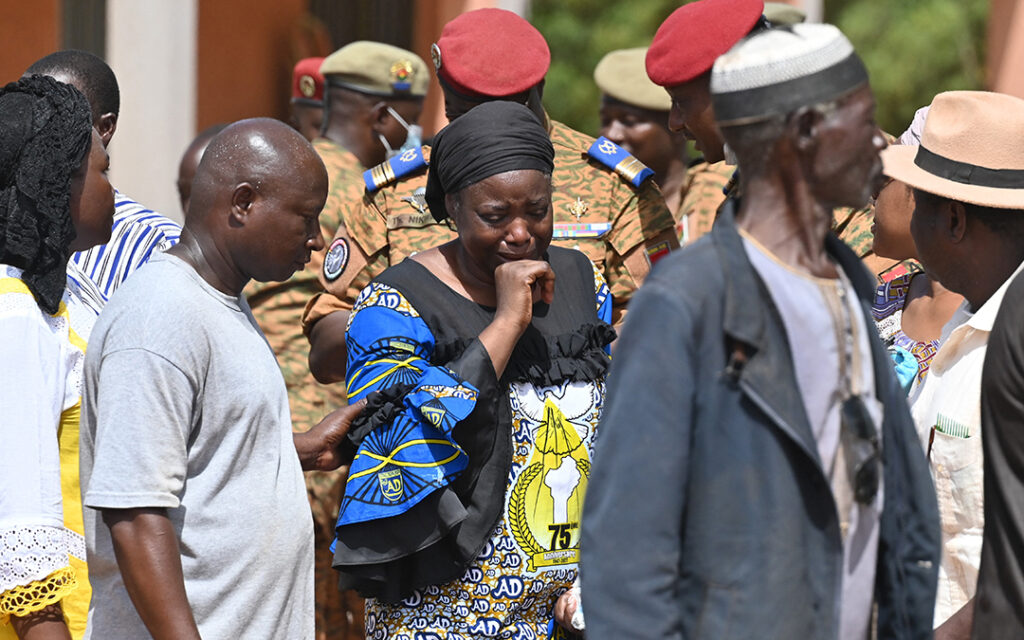ADF STAFF
One quarter of all deaths related to terrorism globally in 2023 occurred in Burkina Faso making it the most severely impacted country in the world. Nearly 2,000 people were killed in 258 terror incidents, a rise of 68 percent from the previous year, according to the 2024 Global Terrorism Index (GTI).
“Deaths from terrorism have increased successively each year since 2014,” the authors of the GTI wrote. “Given the successive years of escalating violence in Burkina Faso and the uncertain political situation the country is likely to experience further increases in terrorism.”
Jama’at Nusrat al-Islam wal-Muslimin (JNIM), which is affiliated with al-Qaida, was the main perpetrator of attacks in the country, although the Islamic State group (IS) began ramping up operations there in late 2022. The world’s epicenter of terrorism also shifted from the Middle East and North Africa to Sub-Saharan Africa, which accounted for nearly half of all terrorism-related deaths last year.
The biggest increase in terrorism in Sub-Saharan Africa was in the Sahel, particularly in the tri-border areas shared by the junta-led countries of Burkina Faso, Mali and Niger. Nigeria and Somalia also recorded high levels of terrorist violence.
In Somalia, al-Shabaab is believed to protect pirates in exchange for 30% of all ransom proceeds and a cut of any loot. The number of piracy incidents in the country is increasing after a six-year lull.
Terrorist violence tends to be more intense in areas where government, nonstate actors, rebels and extremists compete for control, the index reported. In the Sahel, terrorism often is linked to cattle and livestock rustling, illegal gold mining, drug trafficking, kidnapping, and ransom demands.
The GTI highlighted several developments over the past two years that fueled terrorist violence in the Sahel:
* The 2022 withdrawal of French forces from Mali. This left the country to handle all security responsibilities with support from pro-government militias and Russia’s Wagner Group, all of which are accused of committing atrocities against civilians.
* The June 2023 termination of the United Nations Multidimensional Integrated Stabilization Mission in Mali, which happened after the military junta withdrew its support. Researchers found that conflict intensifies in areas where U.N. missions end.
* The July 2023 coup in Niger and the resulting political instability that “may provide extremist groups with increased opportunities to recruit and incite violence,” the report’s authors found.
Instability throughout the Sahel is driven by terrorist organizations such as Ansaroul Islam, Boko Haram, the Group for the Support of Islam and Muslims (GSIM), the IS, and JNIM. Boko Haram and the IS also are active in northern Cameroon. JNIM has expanded into Benin and Togo.
According to the index, the IS was responsible for 1,636 terrorism-related deaths in 2023, making it the world’s deadliest terrorist organization.
The deadliest IS attack in 2023 was on four military columns in Burkina Faso in February. Terrorists killed at least 71 soldiers while security forces reported 160 militants died in the battle.
A surge of IS attacks on security forces and civilians in Burkina Faso began in late 2022. In response, the junta recruited 50,000 civilian auxiliaries called Volunteers for the Defense of the Homeland (VDP) to support local militias.
The IS responded by attacking areas where the military recruited VDPs. This included a January 2023 attack that killed 12 men in Dassa. According to a 46-year-old witness, IS fighters demanded to know whether anyone had registered to be a VDP. The men said they had not.
“After people denied that, they killed the men and left,” the witness told Human Rights Watch.
A 27-year-old woman said armed fighters riding motorbikes and wearing ammunition belts stormed the village of Zincko, also in January 2023.
“They gave us 48 hours to leave,” she told Human Rights Watch. “They stopped to say that the day after tomorrow a wave will be coming, and that they don’t want to find anyone here.”

